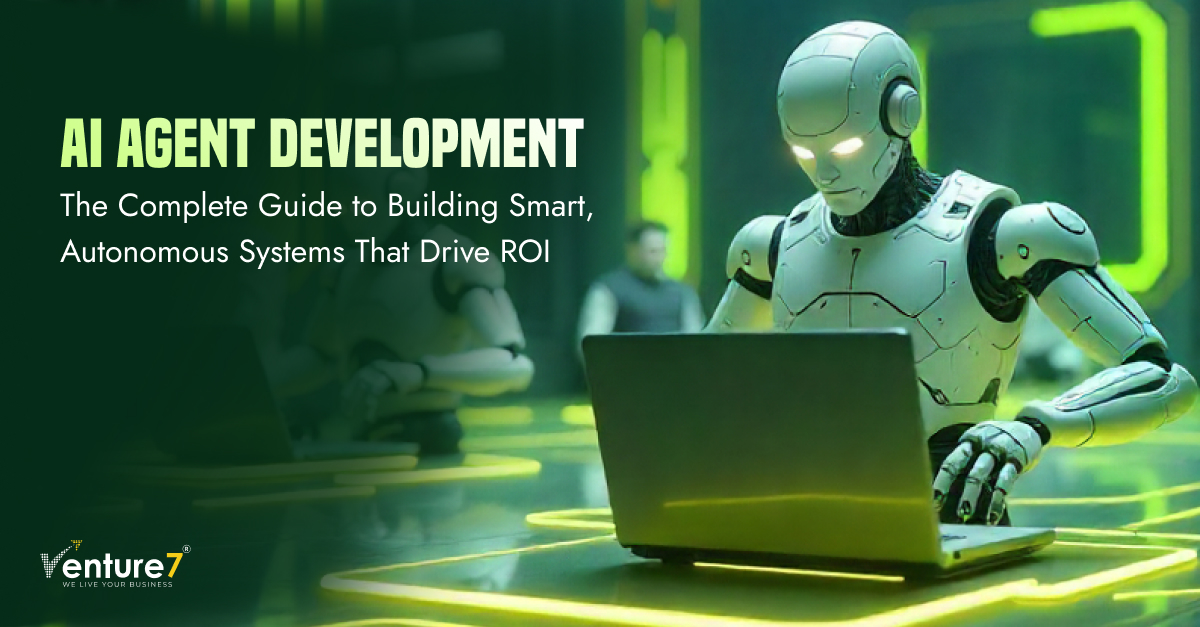Artificial intelligence has moved far beyond simple task automation.
The next leap is here — AI agents — systems capable of thinking, reasoning, and acting autonomously to achieve business goals.
From managing customer interactions to optimizing operations, AI agent development is transforming how enterprises create value.
This guide explains what AI agents are, how they work, and how to build smart, ROI-driven autonomous systems for your business.
Understanding AI Agent Development
AI Agent Development is the process of creating intelligent software entities that can perceive their environment, make decisions, and take actions without constant human direction.
These systems combine machine learning, natural language understanding, and reasoning models — often powered by Large Language Models (LLMs) like GPT or Claude — to achieve adaptive, context-aware automation.
Key Traits of AI Agents
- Autonomy: Operate independently toward defined objectives.
- Learning: Continuously refine performance based on data.
- Reasoning: Choose optimal actions in dynamic environments.
- Collaboration: Work with other systems or agents to achieve shared goals.
By integrating these capabilities, AI agents move from “scripted” automation to goal-oriented intelligence, driving measurable ROI across industries.
How AI Agents Work: The Intelligent Feedback Loop
Every AI agent operates through a cognitive cycle known as Sense → Decide → Act → Learn:
- Sense: Collects structured and unstructured data from APIs, CRMs, IoT devices, or user inputs.
- Decide: Applies logic and LLM reasoning to interpret data and plan the next step.
- Act: Executes the task — sending reports, updating records, or communicating with users.
- Learn: Measures results, refines behavior, and improves future actions.
This continuous feedback loop allows AI agents to self-optimize, making them faster and more accurate over time.
Different Types of AI Agents (and When to Use Them)
1. Reactive Agents – Fast Responders
Respond instantly to inputs without storing past data. Ideal for FAQs, notifications, or sensor alerts.
2. Proactive Agents – Predictive Thinkers
Anticipate needs using data patterns and forecasts. Used in predictive maintenance or marketing optimization.
3. Adaptive Agents – Continuous Learners
Analyze feedback and adapt over time. Common in personalization engines or recommendation systems.
4. Collaborative Agents – Team Players
Communicate with other agents to achieve complex, multi-stage goals — like logistics coordination or IT automation.
5. Autonomous Agents – Full Decision-Makers
Execute tasks from start to finish with minimal oversight, ideal for finance, operations, and customer engagement workflows.
Each type serves a distinct role in building intelligent agent systems that balance efficiency, control, and scalability.
Why Businesses Are Investing in AI Agent Development
Modern organizations are turning to AI agents not just for cost savings — but for strategic acceleration.
1. Operational Efficiency
AI agents run 24/7, handling repetitive work and freeing humans for creative problem-solving.
2. Lower Costs
Automation reduces overhead and minimizes errors, delivering direct ROI within months of deployment.
3. Faster Decision-Making
LLM-powered reasoning enables real-time insights and automated responses across business functions.
4. Scalable Intelligence
Once developed, agents can be replicated across departments with minimal additional investment.
5. Improved Customer Experience
Agents provide contextual, human-like interactions — increasing satisfaction and loyalty.
6. Competitive Advantage
Enterprises adopting AI agents now are shaping smarter, leaner, data-driven business models that outpace their competitors.
Business Use Cases: Where AI Agents Deliver the Most ROI
Customer Engagement
AI agents resolve queries, personalize responses, and route complex cases automatically.
Sales and Marketing
Agents qualify leads, manage pipelines, and optimize campaigns using behavioral insights.
Finance and Operations
From expense tracking to anomaly detection, agents ensure precision and compliance.
Supply Chain and Logistics
Multi-agent systems coordinate demand forecasting, inventory, and delivery optimization.
Healthcare and Research
Agents assist with diagnostics, summarize patient data, and automate documentation for clinicians.
Each implementation demonstrates how custom AI agent development transforms processes into self-managing, intelligent workflows.
How to Build a Custom AI Agent: A Practical Roadmap
Building an AI agent that truly delivers business value requires clear objectives and a robust strategy.
Step 1: Identify the Objective
Define the business challenge — e.g., automate ticket triage, optimize resource allocation, or enhance support operations.
Step 2: Design the Agent Architecture
Select between single-agent or multi-agent setups based on task complexity and data flow.
Step 3: Choose the Technology Stack
Use frameworks such as LangChain, CrewAI, AutoGPT, and APIs like OpenAI GPT for reasoning.
Add vector memory tools like Pinecone or Weaviate for contextual recall.
Step 4: Integrate Enterprise Data
Connect CRMs, ERPs, or internal databases to enable contextual decision-making.
Step 5: Train, Test, and Validate
Simulate real-world scenarios and refine model accuracy, reasoning, and responsiveness.
Step 6: Deploy and Monitor
Deploy the agent, collect feedback, and apply performance analytics for continuous improvement.
When executed properly, this process produces a self-optimizing digital workforce aligned with your enterprise goals.
Challenges and Best Practices in AI Agent Development
Data Quality: Garbage in, garbage out. Use clean, labeled, and relevant datasets.
Security & Compliance: Agents must adhere to privacy and governance standards.
Explainability: Ensure decisions are traceable for auditing and trust.
Maintenance: Continuous retraining and evaluation keep agents effective.
The most successful AI initiatives combine robust technology with domain expertise and strategic alignment — precisely where specialized partners add value.
Partnering with Venture7®: Building the Future of Intelligent Automation
Developing production-grade AI agents requires a blend of technical expertise, data strategy, and system integration.
At Venture7®, we design and deploy AI Agent Development Solutions that help enterprises automate intelligently and scale efficiently.
Our offerings include:
- End-to-end agent design, development, and deployment
- LLM integration and model optimization
- Multi-agent orchestration for enterprise workflows
- Continuous learning and performance tracking
- Integration with cloud, CRM, and RPA systems
Venture7® transforms automation into intelligence — enabling your business to operate faster, smarter, and with measurable ROI.
Get a Free Consultation to explore how AI agents can revolutionize your workflows.
Conclusion
AI Agent Development marks the next era of business transformation.
By combining autonomy, intelligence, and adaptability, AI agents deliver more than automation — they deliver strategic growth and measurable returns.
As organizations evolve toward intelligent operations, those that embrace autonomous AI systems today will define the competitive edge of tomorrow.
Start your journey with Venture7® — where innovation meets intelligent automation.
Explore our AI Development Services for enterprise-grade autonomous systems.





